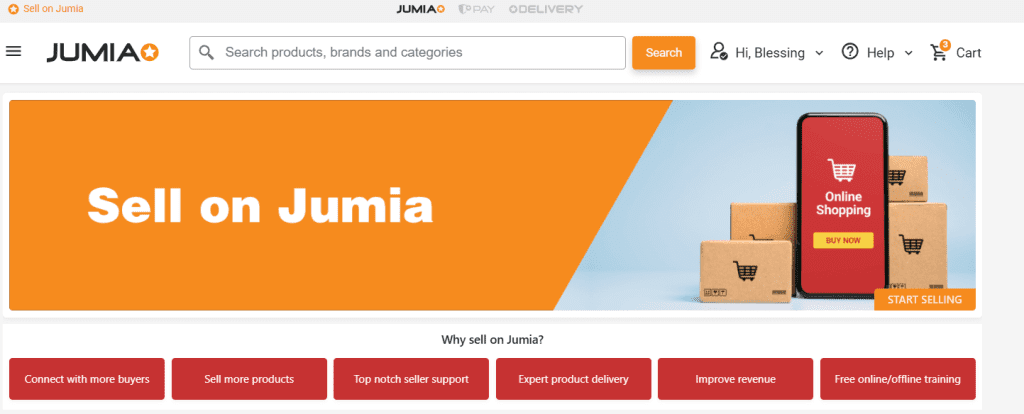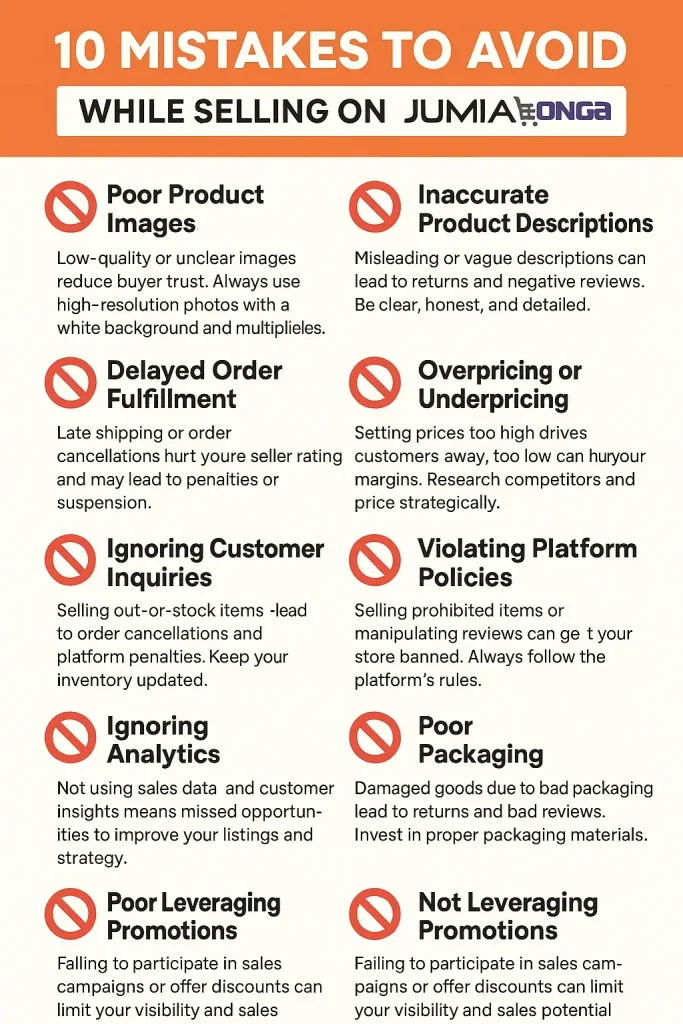Please Follow us on social media >>>>
How to Sell on Jumia and Konga from Home (Step-by-Step Guide)
Learn a step-by-step guide on how to sell on Jumia and Konga from home.
If you’ve ever dreamed of running an online store without needing your own website, then selling on platforms like Jumia and Konga is your chance.
With just a smartphone or laptop, internet connection, and a bit of commitment, you can start earning from the comfort of your home.
This guide walks you through everything step-by-step. But before we go into that, let me clear up a few misconceptions about selling on Jumia and Konga.
Debunking Common Misconceptions About Selling on Jumia and Konga
Myth: Only Established Businesses Can Sell
Reality: Jumia and Konga welcome sellers of all sizes, including small businesses and individuals. The onboarding process is user-friendly, making it easy for anyone to start.
Myth: Selling Fees Are Too High
Reality: While there are commissions and listing fees, many sellers find the increased exposure and sales far outweigh these costs. Plus, promotional campaigns can boost visibility without significant upfront investment.
Myth: Sellers Handle All Customer Service and Logistics
Reality: Both platforms offer robust support, including logistics solutions for shipping and delivery. This allows sellers to focus on providing quality products while the platform manages logistics.
If you can get these myths out of your head, then you are halfway to earning your first income with Jumia and Konga.
This is the only way for you to see the true benefits of joining Jumia and Konga and paving the way for a successful online retail journey!
MYTH ABOUT SELLING ON JUMIA AND KONGA
Whether you’re a self-paced learner looking for flexibility or someone who thrives with additional support and guidance, we have a plan for you.
Common Misconception
- Only Established Businesses Can Sell
- Selling Fees Are Too High
- Sellers Handle All Customer Service and Logistics
- You Need a Physical Store to Sell Online
- Selling Online Is Too Complicated
- Payments Are Unreliable
- You Can’t Compete with Big Brands
Selling online Reality
- Jumia and Konga welcome sellers of all sizes, including small businesses and individuals.
- Fees are outweighed by increased exposure and sales; promotional campaigns can boost visibility.
- Both platforms offer logistics solutions, allowing sellers to focus on quality products while they manage shipping.
- No physical store is required; you can sell directly from home or any location with an internet connection.
- The onboarding process is straightforward, with step-by-step guides to help you get started easily.
- Jumia and Konga provide secure payment systems, ensuring timely and reliable transactions.
- With the right marketing and quality products, small sellers can effectively compete and attract loyal customers.
4 Ways to Decide What You Want to Sell on Jumia and Konga:

The first step to successfully selling on Jumia is deciding what products to offer. Here’s how to identify your niche, along with examples of who might excel in each category:
- Identify Your Interests and Expertise
Consider what you are passionate about or knowledgeable in. Selling products that interest you makes the process more enjoyable and engaging. - Research Market Demand
Look for trends and popular items. Use tools like Google Trends or social media insights to identify products that are currently in demand. - Evaluate Competition
Check what other sellers are offering within your chosen category. Analyze their pricing, quality, and customer feedback to find gaps in the market you can fill. - Consider Profit Margins
Calculate potential profit margins for different product categories. Focus on items that not only sell well but also provide decent returns on investment.
Popular categories to consider, along with examples of who might thrive in each:
- Electronics:
Best for: Tech enthusiasts and gadget lovers.
Example: If you enjoy the latest smartphones and accessories, you could sell items like Bluetooth headphones or portable chargers. - Fashion:
Best for: Trendsetters and fashion-conscious individuals.
Example: If you have a flair for style, consider selling trendy clothing or unique handbags. Your personal style can guide your inventory choices. - Household Items:
Best for: Home decor enthusiasts and organizers.
Example: If you love interior design, you could sell decorative items like wall art or kitchen gadgets that help others enhance their living spaces. - Groceries:
Best for: Foodies and health-conscious individuals.
Example: If you enjoy cooking or have knowledge of organic products, you might sell packaged snacks or health foods that cater to a growing market. - Beauty and Personal Care Products:
Best for: Beauty aficionados and skincare experts.
Example: If you’re passionate about skincare, consider selling popular brands of moisturizers or makeup products that you personally recommend.
Tips:
- Go for products with consistent demand.
- Start with items you can easily source locally.
- Check the Jumia and Konga websites to see trending products.
6 Steps to Register and start selling on Jumia:

Step 1: Visit the Jumia Vendor Registration Page.
Go to the official Jumia Marketplace registration portal:
Click on “Start Selling Now” to begin your registration.
Step 2: Fill Out the Registration Form
Provide the following details:
- Business type (Individual or Company)
- Full name
- Email address
- Phone number
- Store name
- Business location
- Bank account details (for receiving payments)
You’ll also need to upload:
- Valid ID (for individuals)
- CAC documents (for companies)
Step 3: Accept the Seller Agreement
Carefully read and agree to Jumia’s Seller Agreement and Terms & Conditions.
Step 4: Complete the Online Training
Jumia requires all new sellers to complete a short training session. This helps you understand:
- How to manage your store
- How to list products
- Order fulfillment and delivery
- Customer service expectations
Step 5: List Your Products
Once your account is approved:
- Log in to your Seller Center.
- Upload at least 5 products with clear images, descriptions, and prices.
Step 6: Start Selling!
Your store will go live, and you can begin receiving orders. Jumia will handle
- Customer service
- Logistics (if you opt for Jumia Express)
- Payment processing
How to Register and start selling on Konga:
- Go to Konga.com.
- Click “Become a Seller.”
- Submit your business and personal details.
- Wait for account approval (usually takes 24–72 hours).
- Log into seller dashboard after approval.
Prepare Your Products for Sale
- Take high-quality photos with a clean background.
- Write detailed product descriptions (features, benefits, usage). This is one area Nigerians can still improve on.
- Set competitive prices based on similar listings.
- Make sure you have stock or access to reliable suppliers.
Pro tip: Many sellers use Lagos-based suppliers or import small quantities from platforms like 1688.com and Alibaba.
Upload Products to Your Dashboard
Once your seller account is approved:
- Log into your Jumia Seller Center or Konga Seller HQ.
- Go to Products → Add New Product
- Fill in the product details, images, category, pricing, and quantity.
- Submit for review (Jumia usually reviews within 24–48 hours).
Handling Orders and Delivery
Jumia and Konga use their own logistics to handle most deliveries.
- Once you receive an order, package the item properly (branded or plain packaging is allowed).
- Drop it off at the closest partner hub or wait for pickup (depending on location).
- The platform handles delivery to the customer.
You get paid into your registered bank account weekly or biweekly, depending on the platform.
Bonus Tips to Succeed in Selling on Jumia and Konga
- Promote your products on WhatsApp, Instagram, and Facebook to drive extra traffic.
- Respond quickly to orders and platform messages to maintain good ratings.
- Join seller forums or Facebook groups to learn from other sellers.
- Consider starting small and reinvesting profits to scale gradually.
So, you see, selling on Jumia and Konga is one of the fastest ways to enter e-commerce in Nigeria without upfront tech or logistics costs. It’s perfect for side hustlers, students, stay-at-home parents, and anyone who wants to earn online.
Stay consistent, deliver quality, and focus on building your seller reputation, your store can become a reliable source of monthly income.
But before you jump on the next wagon to start selling, please beware of the following pitfalls.
10 common mistakes to avoid when selling on Konga and Jumia
1. Poor Product Images
Low-quality or unclear images reduce buyer trust. Always use high-resolution photos with a white background and multiple angles.
2. Inaccurate Product Descriptions
Misleading or vague descriptions can lead to returns and negative reviews. Be clear, honest, and detailed.
3. Delayed Order Fulfillment
Late shipping or order cancellations hurt your seller rating and may lead to penalties or suspension.
4. Ignoring Customer Inquiries
Slow or no response to customer questions can result in lost sales and poor feedback.
5. Overpricing or Underpricing
Setting prices too high drives customers away; too low can hurt your margins. Research competitors and price strategically.
6. Not Managing Inventory
Selling out-of-stock items leads to order cancellations and platform penalties. Keep your inventory updated.
7. Violating Platform Policies
Selling prohibited items or manipulating reviews can get your store banned. Always follow the platform’s rules.
8. Ignoring Analytics
Not using sales data and customer insights means missed opportunities to improve your listings and strategy.
9. Poor Packaging
Damaged goods due to bad packaging lead to returns and bad reviews. Invest in proper packaging materials.
10. Not Leveraging Promotions
Failing to participate in sales campaigns or offer discounts can limit your visibility and sales potential.

Send us a message if you need help on how to sell on Jumia and Konga from home, or any other online opportunity.








